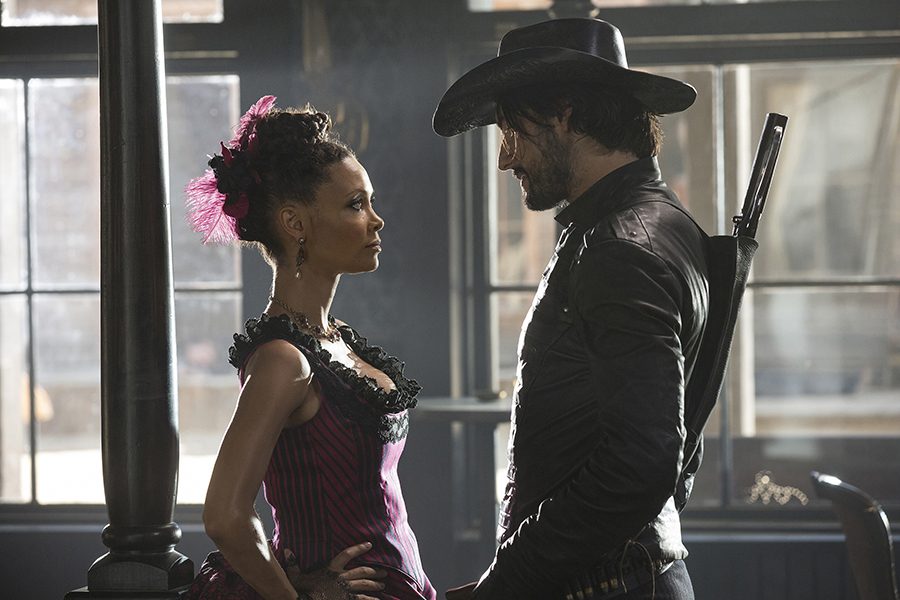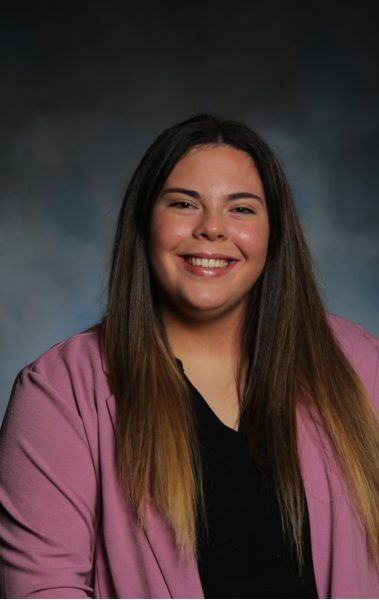TV review: ‘Westworld’ on HBO is a real trip
Thandie Newton and Rodrigo Santoro in "Westworld." (John P. Johnson/HBO)
September 29, 2016
By Verne Gay
Westworld premieres Sunday at 9 p.m. on HBO.
Westworld is a theme park where the very wealthy go to indulge their fantasies, which are either violent, sexual or both. The theme is the Wild West, and as far as patrons are concerned, when they step off that train, they step off into another century. The so-called “hosts” who inhabit this world are perfect cyborgs, made in a secret location, and programmed by Bernard Lowe (Jeffrey Wright). They each follow an elaborate “narrative” which is written by one of many authors who work in the bowels of Westworld, far out of sight of the guests. These narratives play out over and over again, in an endless loop cycle.
One day, Lowe notices — uh-oh — a possible glitch in a host, while Dr. Robert Ford (Anthony Hopkins) — who oversees the whole shebang — is puzzled by behavior in certain “recoded” hosts, notably one who quotes Shakespeare, specifically “Henry IV.” These hosts — programmed to talk and behave like people on the wild frontier, and to die violently when guests decide to off them — are not supposed to do that.
Then, there are the guests. You shall get to know one only as “The Man in Black” (Ed Harris). Treacherous and brutal, he’s come back to Westworld to indulge more than just fantasies. Two of the hosts, Dolores Abernathy (Evan Rachel Wood) and Maeve Millay (Thandie Newton) may eventually learn all the secrets of this place.
The show is based on the 1973 movie of the same name, which was written and directed by Michael Crichton. Jonathan Nolan (“The Dark Knight”) is creator and showrunner here.
MY SAY: Where the rest of us see long lines, endless days and fervently hope to avoid personal bankruptcy when it’s all over — in other words, that family trip to Disney World — Michael Crichton, who died in 2008, obviously saw something else. He saw the distillation of our hopes and dreams, then the exploitation of them, which lead to … our collective nightmares.
“Westworld” was in a sense just an earlier, wackier iteration of his greatest theme park from hell, “Jurassic Park.” HBO’s adaptation still embraces Crichton’s obsessions and themes — notably technology’s perverse assault on the human soul — but also the obsessions of so many other cinematic and literary landmarks. There’s a little bit of “Frankenstein” here and a whole lot of “Bladerunner.” “The Matrix” shadows “Westworld” — how could it not? — but so does Shakespeare’s “The Tempest” where (after all) “we are such stuff as dreams are made on.” This theme park built on hubris and plastic is also a dreamscape, run by Hopkins’ Dr. Ford, who practically demands you think of him as Prospero. “Hell is empty and all the devils are here,” says one of the hosts, echoing Ariel of “The Tempest.” Expect Hopkins to eventually mutter: “This thing of darkness, I acknowledge mine.”
If all this sounds heady, pretentious or derivative, then “Westworld” may eventually turn out to be guilty as charged. But from at least from the first two episodes sampled, “Westworld” is also a genuinely different new series that offers something even better than that: It’s genuinely engaging.
“Westworld” works on many levels, but the most obvious level is the visceral, blood-spilling one. Sam Peckenpaugh must have inspired the authors of Westworld’s many narratives, because more bullets fly and more bodies fall and more blood spills than even he could have ever hoped for. The violence is searing, appalling, and mitigated only by the knowledge that it’s not real. Those host bodies fall, only to be reanimated after a quick dip in the giant-polymers tank and a tuneup by Dr. Lowe.
That’s another key theme here. The patrons of Westworld are inured to the violence, but use it to feed their sadistic fantasy life. This might not just be a cautionary tale on the potential dangers of virtual reality but a commentary on that great American dream machine we all know and love. You know: The one in our living room.
BOTTOM LINE: Lots of big ideas, lots of far-flung literary/cinematic references, and lots of violence. Yup, “Westworld” is a lot — but also a winner with a potentially exciting payoff.
GRADE: A-
———
©2016 Newsday
Visit Newsday at www.newsday.com
Distributed by Tribune Content Agency, LLC.








